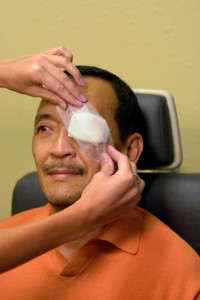 While your doctor is your first and foremost resource for your individual postoperative care plan, a number of general guidelines are recommended. Following an enucleation or evisceration surgery, your doctor will likely prescribe a few oral medications such as antibiotics, steroids, and pain-relievers. It is important that you carefully follow the specific medication instructions to prevent any post-surgical complications. While your ocularist does have a general knowledge of these medications, your doctor should be consulted directly with any questions or concerns you may have.
While your doctor is your first and foremost resource for your individual postoperative care plan, a number of general guidelines are recommended. Following an enucleation or evisceration surgery, your doctor will likely prescribe a few oral medications such as antibiotics, steroids, and pain-relievers. It is important that you carefully follow the specific medication instructions to prevent any post-surgical complications. While your ocularist does have a general knowledge of these medications, your doctor should be consulted directly with any questions or concerns you may have.
To maintain the eye socket shape and protect the healing tissue, your surgeon will most likely insert a clear, removable shield following surgery. Known as an ocular conformer, this piece should be worn until your first visit with the ocularist six to eight weeks following surgery. If the conformer becomes dislodged, and you are not comfortable reinserting it, please contact an ocularist for further assistance. Your ocularist can design a custom fitting conformer that will more accurately fit your socket for the duration of the healing period. It is not uncommon for soft tissues in the eye socket to atrophy and the ocular implant to settle significantly following surgery.
For more information on postoperative care following an enucleation or evisceration surgery, please contact a board certified ocularist today at any one of our five Southern California office locations. We would be happy to answer any questions or concerns you may have, before or after your surgical procedure.

